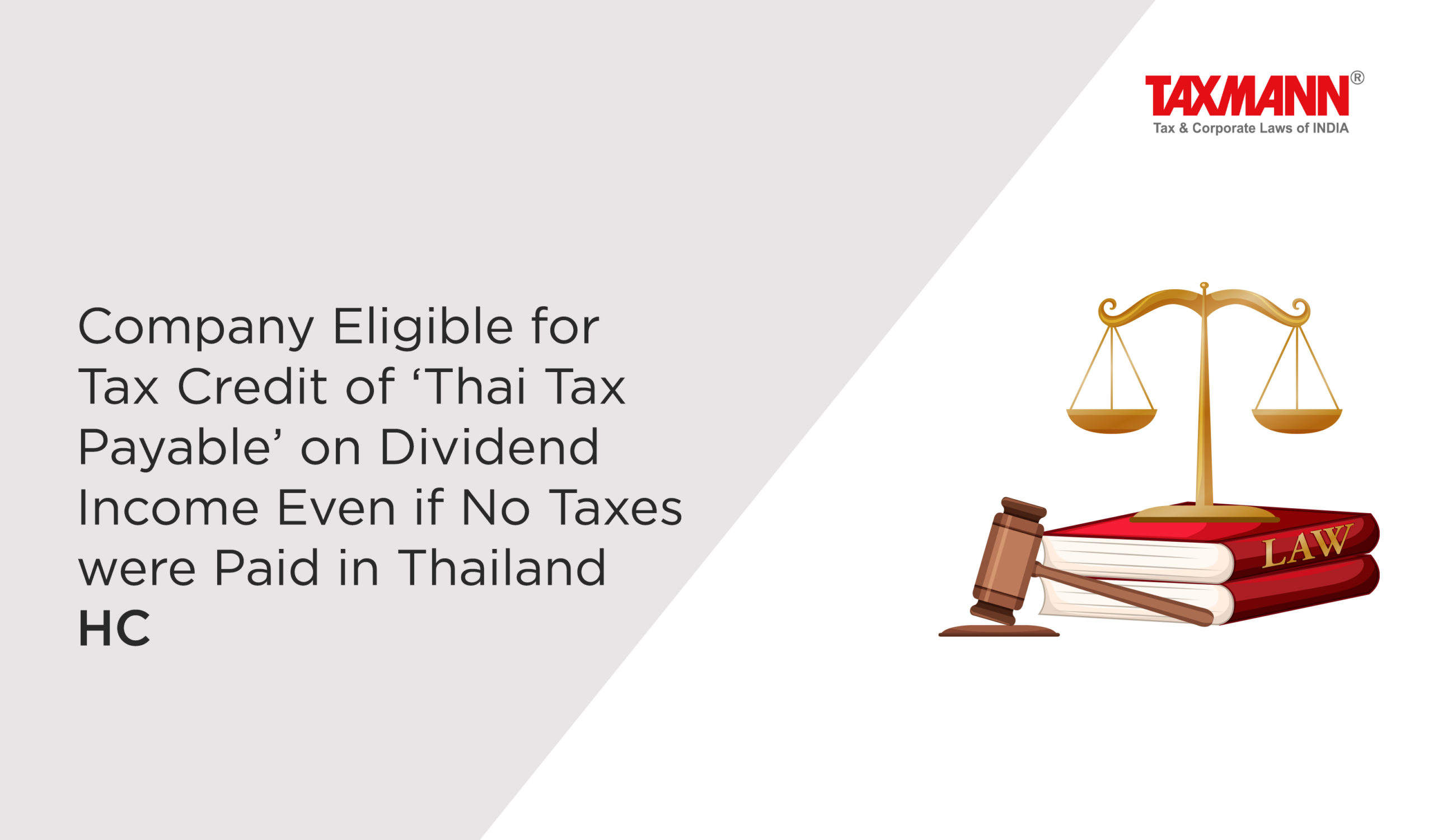Company Eligible for Tax Credit of ‘Thai Tax Payable’ on Dividend Income Even if No Taxes were Paid in Thailand | HC
- Blog|News|International Tax|
- 2 Min Read
- By Taxmann
- |
- Last Updated on 21 July, 2023

Case Details: Pr. CIT v. Polyplex Corporation Ltd. - [2023] 152 taxmann.com 479 (Delhi)
Judiciary and Counsel Details
-
- Rajiv Shakdher & Ms Tara Vitasta Ganju, JJ.
- Kunal Sharma & Ms Zehra Khan, Advs. for the Appellant.
- Ved Jain & Nischay Kantoor, Advs. for the Respondent.
Facts of the Case
Assessee filed its return of income for the Assessment Year 2010-11 by including dividend income received from its Thai Subsidiary. Assessee had claimed a tax credit in respect of tax, which it would have to pay in Thailand on dividends received ordinarily, but for the statutory regime obtaining in Thailand, which exempted tax levy in that country.
Without the exemption in Thailand, the assessee would have to pay a 10% tax on dividends from its Thai subsidiary. Thus, the assessee claimed a tax credit for the amount quantified at the said rate under the provisions of paragraphs 2 & 3 of the Article 23 of the Indo-Thai DTAA.
Disagreed by this, the Assessing Officer (AO) declined the tax credit sought in the Return of Income (ITR).
On appeal, the CIT(A) upheld the additions made by AO, which the Tribunal subsequently reversed. The matter then reached the Delhi High Court.
High Court Held
The High Court held that the controversy concerns the interpretation of Article 23 of the Indo-Thai DTAA. Paragraph 2 of Article 23 allows tax credit against tax payable in India under the Indian Income Tax Act, qua “Thai tax payable” under the laws of Thailand, whether directly or by deduction, by a resident of India concerning profits or income arising in Thailand, which is subjected to tax both in India and in Thailand.
Further, Paragraph 3 of Article 23 of the Indo-Thai DTAA defines the term “Thai Tax Payable”. It includes amounts that would be payable as Thai tax for any year, except for exemptions or reductions provided by the Investment Promotion Act or Thai Revenue Code to promote economic development in Thailand. This may also apply to future modifications or additions to the laws for the same purpose.
In simple words, Paragraph 3 of Article 23 uses a deeming fiction to include the tax that would have been payable without exemptions or reductions under the referred statutes, which aim to promote economic development in Thailand.
Clearly, the provision is configured to incentivize investments in Thailand by granting tax credit for that amount which, otherwise, would have been payable as tax to the Thai state but was not paid due to exemption or reduction granted under the said enactments.
Article 23 of the Indo-Thailand DTAA grants credit for notional tax to encourage economic development. The interpretation of “Thai tax payable” or “Indian tax payable” should be based on the plain reading of paragraphs 3 and 5 of the article unless there is ambiguity. These paragraphs illustrate the mutual interest in promoting investment for economic development in both countries
Therefore, AO’s argument that the tax credit could not be extended to the assessee because the assessee had not paid tax in Thailand was completely misconceived. The benefit under Article 23 of the Indo-Thai DTAA could be extended in a situation where the tax hadn’t actually been paid.
Disclaimer: The content/information published on the website is only for general information of the user and shall not be construed as legal advice. While the Taxmann has exercised reasonable efforts to ensure the veracity of information/content published, Taxmann shall be under no liability in any manner whatsoever for incorrect information, if any.

Taxmann Publications has a dedicated in-house Research & Editorial Team. This team consists of a team of Chartered Accountants, Company Secretaries, and Lawyers. This team works under the guidance and supervision of editor-in-chief Mr Rakesh Bhargava.
The Research and Editorial Team is responsible for developing reliable and accurate content for the readers. The team follows the six-sigma approach to achieve the benchmark of zero error in its publications and research platforms. The team ensures that the following publication guidelines are thoroughly followed while developing the content:
- The statutory material is obtained only from the authorized and reliable sources
- All the latest developments in the judicial and legislative fields are covered
- Prepare the analytical write-ups on current, controversial, and important issues to help the readers to understand the concept and its implications
- Every content published by Taxmann is complete, accurate and lucid
- All evidence-based statements are supported with proper reference to Section, Circular No., Notification No. or citations
- The golden rules of grammar, style and consistency are thoroughly followed
- Font and size that’s easy to read and remain consistent across all imprint and digital publications are applied



 CA | CS | CMA
CA | CS | CMA
